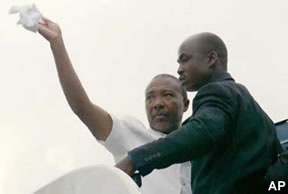
A Congressional
Resolution Calls For The Transfer Charles
Taylor To The Special Court Of Sierra Leone
The Perspective
Atlanta, Georgia
Posted May 5, 2005
HCON 127 IH
109th CONGRESS
1st Session
H. CON. RES. 127
 |
IN THE HOUSE OF REPRESENTATIVES
April 12, 2005
Mr. ROYCE (for himself, Mr. LANTOS, Mr. WOLF, Mrs. KELLY, and Mr. SNYDER) submitted the following concurrent resolution; which was referred to the Committee on International Relations
CONCURRENT RESOLUTION
Calling on the Government of the Federal Republic of Nigeria to transfer Charles Ghankay Taylor, former President of the Republic of Liberia , to the Special Court for Sierra Leone to be tried for war crimes, crimes against humanity, and other serious violations of international humanitarian law.
Whereas on January 16, 2002, as requested by United Nations Security Council Resolution 1315 (2000), an agreement was signed by the Government of the Republic of Sierra Leone and the United Nations to establish the Special Court for Sierra Leone;
Whereas the Special Court for Sierra Leone was given the power to prosecute persons who have committed and `bear the greatest responsibility' for war crimes, crimes against humanity, other serious violations of international humanitarian law, and certain crimes under Sierra Leonean law committed within the territory of Sierra Leone during that country's brutal civil war during the period after November 30, 1996;
Whereas on June 4, 2003, the Special Court for Sierra Leone unsealed an indictment issued on March 3, 2003, against Charles Ghankay Taylor, former President of the Republic of Liberia , charging him with seventeen counts of war crimes, crimes against humanity, and other violations of international humanitarian law relating to his role in directly supporting and materially, logistically, and politically abetting the rebel Revolutionary United Front (RUF) and its actions, including its notorious, widespread, and systematic attacks upon the civilian population of Sierra Leone;
Whereas the indictment of Charles Taylor includes charges of terrorizing civilians and subjecting civilians to collective punishment, mass murder, sexual slavery and rape, abduction and hostage taking, severe mutilation, including the cutting off of limbs and other physical violence and inhumane acts, enslavement, forced labor, forced military conscription, including forced conscription of children, theft, arson, looting, and pillage, and widespread attacks upon the United Nations Mission in Sierra Leone (UNAMSIL) and humanitarian workers by the Revolutionary United Front combatants;
Whereas the Revolutionary United Front was notorious for brutally murdering and torturing civilians, including the amputation of limbs with machetes, and by carving `RUF' onto the bodies of thousands of victims, including women and children;
Whereas the Revolutionary United Front made widespread use of abducted children as laborers and soldiers and forced many of the abducted children to perform severe human rights abuses, constituting a serious crime under the jurisdiction of the Special Court for Sierra Leone;
Whereas on August 11, 2003, Charles Taylor departed Liberia for Calabar, Nigeria, where he was granted asylum and, according to press reports, agreed to end his involvement in Liberian politics;
Whereas in September 2003 the Government of the Federal Republic of Nigeria warned Taylor that it would `not tolerate any breach of this condition and others which forbid him from engaging in active communications with anyone engaged in political, illegal or governmental activities in Liberia' ;
Whereas the United States, Nigeria, and other concerned nations have contributed extensive political, human, military, financial, and material resources toward the building of peace and stability in Liberia and Sierra Leone;
Whereas the Special Court for Sierra Leone has contributed to developing the rule of law in Sierra Leone and is deserving of support;
Whereas on March 17, 2005, the United Nations Secretary-General reported to the United Nations Security Council that Charles Taylor's `former military commanders and business associates, as well as members of his political party, maintain regular contact with him and are planning to undermine the peace process' in Liberia ;
Whereas David Crane, Chief Prosecutor at the Special Court for Sierra Leone, stated: `Unless and until Charles Taylor is brought to justice, there will be no peace. Charles Taylor is a big cloud hanging over Liberia . He is still ruling the country from his house arrest in Calabar. His agents remain influential in the country.';
Whereas on March 22, 2005, Jacques Klein, the United Nations Special Representative of the Secretary-General to Liberia , stated: `Charles Taylor is a psychopath and a killer . . . He's still very much involved [in and is . . . ] intrusive in Liberian politics.'; and
